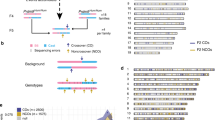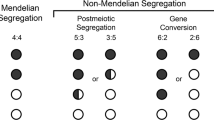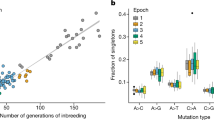Abstract
Mitotic recombination occurs with high frequency in humans1,2 and mice3. It leads to loss of heterozygosity (LOH) at important gene loci and can cause disease4,5,6,7. However, the genetic modulators of mitotic recombination are not well understood. As recombination depends on a high level of nucleotide sequence homology8,9,10,11,12, we postulate that the frequency of somatic variants derived from mitotic recombination should be diminished in progeny from crosses between strains of mice in which nucleotide sequences have diverged. Here we report that mitotic recombination is suppressed, to various degrees in different tissues, in hybrids of distantly related mouse strains. Reintroduction of greater chromosomal homology by backcrossing restores mitotic recombination in offspring. Thus, chromosomal divergence inhibits mitotic recombination and, consequently, may act as a modifier of cancer susceptibility by limiting the rate of LOH. The suppression of mitotic recombination in some F1 hybrids in which meiotic recombination persists indicates that these processes are differentially affected by chromosomal divergence.
This is a preview of subscription content, access via your institution
Access options
Subscribe to this journal
Receive 12 print issues and online access
$209.00 per year
only $17.42 per issue
Buy this article
- Purchase on Springer Link
- Instant access to full article PDF
Prices may be subject to local taxes which are calculated during checkout


Similar content being viewed by others
References
Gupta, P.K. et al. High frequency in vivo loss of heterozygosity is primarily a consequence of mitotic recombination in normal T lymphocytes of human APRT heterozygotes. Cancer Res. 57,1188–1193 (1997).
Holt, D. et al. Interindividual variation in mitotic recombination. Am. J. Hum. Genet . 65, 1423–1427 (1999).
Shao, C. et al. Mitotic recombination produces the majority of the recessive fibroblast variants in heterozygous mice. Proc. Natl. Acad. Sci. USA 96, 9230–9235 (1999).
Cavenee, W.K. et al. Expression of recessive alleles by chromosomal mechanisms in retinoblastoma. Nature 305,779–784 (1983).
Lasko, D., Cavenee, W. & Nordenskjold, M. Loss of constitutional heterozygosity in human cancer. Annu. Rev. Genet. 25, 281–314 (1991).
Qian, F. & Germino, G.G. “Mistakes happen”: Somatic mutation and disease. Am. J. Hum. Genet . 61, 1000–1005 (1997).
Luo, G. et al. Cancer predisposition caused by elevated mitotic recombination in Bloom mice. Nature Genet. 26, 424–429 (2000).
Shen, P. & Huang, H.V. Homologous recombination in Escherichia coli : dependence on substrate length and homology. Genetics 112, 441–457 (1986).
Rayssiguier, C., Thaler, D.S. & Radman, M. The barrier to recombination between Escherichia coli and Salmonella typhimurium is disrupted in mismatch-repair mutants. Nature 342, 396–401 (1989)
Datta, A., Hendrix, M., Lipsitch, M. & Jinks-Robertson, S. Dual role for DNA sequence identity and the mismatch repair system in the regulation of mitotic crossing-over in yeast. Proc. Natl. Acad. Sci. USA 94, 9757–9762 (1997).
Waldman, A.S. & Liskay, R.M. Dependence of intrachromosomal recombination in mammalian cells on uninterrupted homology. Mol. Cell. Biol. 8, 5350–5357 (1988).
de Wind, N., Dekker, M., Berns, A., Radman, M. & te Riele, H. Inactivation of the mouse Msh2 gene results in mismatch repair deficiency, methylation tolerance, hyperrecombination, and predisposition to cancer. Cell 82, 321–330 (1995).
Shao, C. et al. Chromosome instability contributes to loss of heterozygosity in mice lacking p53. Proc. Natl. Acad. Sci. USA 97, 7405–7410 (2000).
Van Sloun, P.P.H. et al. Determination of spontaneous loss of heterozygosity mutation in Aprt heterozygous mice. Nucleic Acids Res. 26, 4888–4894 (1998).
Liang, L., Deng, L., Shao, C., Stambrook, P.J. & Tischfield, J.A. In vivo loss of heterozygosity in T cells of B6C3F1 Aprt+/− mice. Environ. Mol. Mutagen. 35, 150–157 (2000).
Dietrich, W.F. et al. A genetic map of mouse with 4,006 simple sequence length polymorphisms. Nature Genet. 7, 220–225 (1994).
Lindblad-Toh, K. et al. Large-scale discovery and genotyping of single-nucleotide polymorphisms in the mouse. Nature Genet . 24, 381–386 (2000).
O'Neill, R.J.W., O'Neill, M.J. & Graves, J.A.M. Undermethylation associated with retroelement activation and chromosome remodelling in an interspecific mammalian hybrid. Nature 393, 68–72 (1998).
Copeland, N.G. et al. A genetic linkage map of the mouse: current applications and future prospects. Science 262, 57–66 (1993).
Chen, W. & Jinks-Robertson, S. The role of the mismatch repair machinery in regulating mitotic and meiotic recombination between diverged sequences in yeast. Genetics 151, 1299–1313 (1999).
Hagstrom, S.A. & Dryja, T.P. Mitotic recombination map of 13cen-13q14 derived from an investigation of loss of heterozygosity in retinoblastomas. Proc. Natl. Acad. Sci. USA 96, 2952–2957 (1999).
Cichowski, K. et al. Mouse models of tumor development in neurofibromatosis type 1. Science 286, 2172–2176 (1999).
Vogel, K.S. et al. Mouse tumor model for neurofibromatosis type 1. Science 286, 2176–2179 (1999).
Engle, S.J. et al. Adenine phosphoribosyltransferase-deficient mice develop 2,8-dihydroxyadenine nephrolithiasis. Proc. Natl. Acad. Sci. USA 93, 5307–5312 (1996).
Acknowledgements
We thank T. McGuire for comments. This work was supported by grants from NIH (R01DK38185, P01ES05652).
Author information
Authors and Affiliations
Corresponding authors
Rights and permissions
About this article
Cite this article
Shao, C., Stambrook, P. & Tischfield, J. Mitotic recombination is suppressed by chromosomal divergence in hybrids of distantly related mouse strains. Nat Genet 28, 169–172 (2001). https://doi.org/10.1038/88897
Received:
Accepted:
Issue Date:
DOI: https://doi.org/10.1038/88897
This article is cited by
-
Somatic mosaicism in inherited bone marrow failure and chromosomal instability syndrome
Genome Instability & Disease (2021)
-
Mlh1 mediates tissue-specific regulation of mitotic recombination
Oncogene (2004)
-
A Robertsonian translocation suppresses a somatic recombination pathway to loss of heterozygosity
Nature Genetics (2003)
-
Somatic recombination redux
Nature Genetics (2003)
-
Recurrent allelic deletions at mouse chromosomes 4 and 14 in Myc-induced liver tumors
Oncogene (2002)



